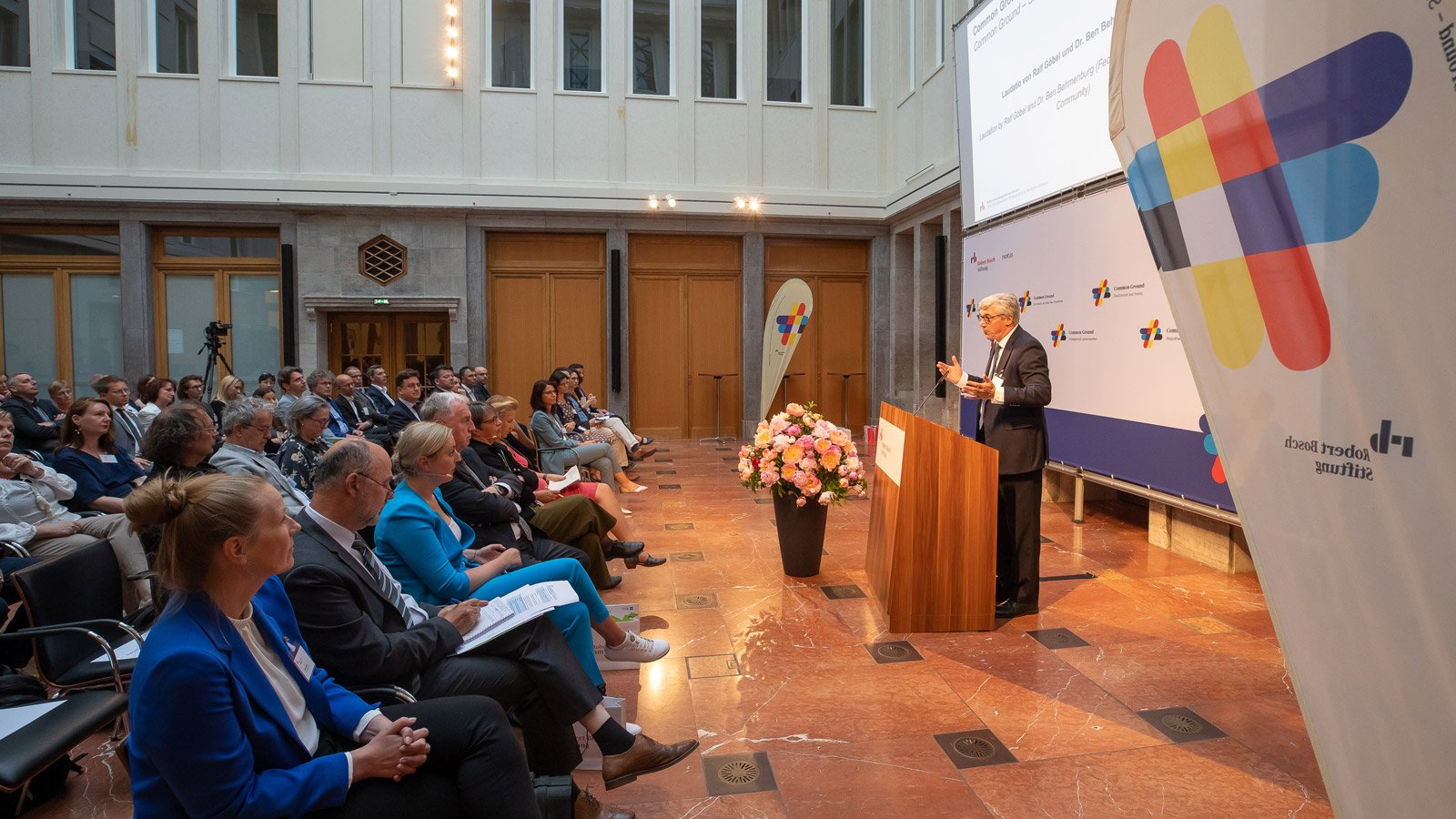“It’s up to us to give people a voice”
How can people work together to make a difference and shape political processes in their own regions? A launch event saw our program “Common Ground - Shaping Regions Across Borders” announce the eight regions chosen to promote and facilitate cross-border participation.
Patrick Barbier, mayor of the French commune of Muttersholtz, was among those at the launch event, even bringing a selection of wildflowers with him to Berlin in a small example of how, above all, democracy in action becomes one thing: real and tangible in the literal sense of the word. After all, the flowers come from a symbolic place – the former customs site on a small island in the middle of the Rhine. Where once thousands of border checks were carried out between France and Germany, today only a few lonely wildflowers have made a home in the concrete. Now, the Franco-German border project R(h)einverbindlich wants to create a paradise for birds and people alike with applied climate and species protection involving citizens on both sides of the river. “Where could be better than an island in the middle of the Rhine to tackle such issues together,” said Dr. Ben Behmenburg, head of the department for cross-border regional cooperation at the Federal Ministry of the Interior and Home Affairs (BMI), in his speech in praise of the project.
This is just one of the many outstanding projects planned by our selected border regions over the coming years. The German-Polish partner cities of Frankfurt (Oder)/Słubice, for example, are planning a joint citizens’ picnic on the banks of the Oder to kick off their participation process. Other border communities hope to launch open citizen exchanges or establish citizen advisory committees. But while each individual project is unique, they all have one thing in common: Everyone involved is very much looking forward to engaging in direct dialogue with local residents. The same goes for respect. After all, it is a well-known truth that motivating people, getting them actively involved, is not always easy, but when it works, it is a huge win. “Cross-border cooperation is something you have to want, something you have to both be allowed and able to do,” Karl-Heinz Lambertz, President of the Parliament of the German-speaking Community in Belgium, summed up the task at hand fittingly: “and above all, you have to go out and do it!”
The European spirit was palpable throughout the event, the air abuzz with French, German, English, and Polish, as well as Swiss German voices. Around 80 representatives from politics, administration, and civil society attended the launch event at the Robert Bosch Stiftung in Berlin, where eight border regions were officially accepted into the funding program on Tuesday, June 14. The program, which has been endowed with 1.6 million euros, will see the regions receive support, both financial and advisory, to develop and shape participation processes for the local population over a period of three years. The regions ultimately selected were border regions as their close ties to neighboring countries leave them perfectly placed to strengthen democracy, cross-border cooperation, and therefore European unity more generally.
“Democracy is about so much more than just holding an election every few years”
“Democracy is never a done deal. It has to be lived, practiced, and modernized. Plus, it has to be something citizens can both shape and experience,” said Claudia Rolf, Program Director on the Democracy team at the Robert Bosch Stiftung, in her welcome speech. “Opening doors for citizens to have their say and help shape policy, giving citizen participation a place in democratic and political decision-making processes, is one answer to the question of how democracy can be put into practice and continuously innovated.” The event’s panel discussion, which was joined live from Paris by Claudia Chwalisz, Innovative Citizen Participation Lead at the OECD, focused on the opportunities and challenges posed by citizen participation. How can we make the most of participation structures to strengthen trust in and satisfaction with democracy? Why does politics have nothing to fear from citizen participation? How do we make sure we also reach people who feel ambivalent about democracy? “Democracy is about so much more than just holding an election every few years,” said Claudia Chwalisz. “We have to find new ways to give people a voice to make their concerns heard. We need to give them a chance to exert direct influence over the decisions that impact their lives.”
Common Ground – Shaping Regions Across Borders
With "Common Ground" we promote the cross-border participation of the population in the shaping and development of their border region. In the long term, sustainable participation structures are to be created.
- Watch the recording of the event
- Learn more about the selected regions

